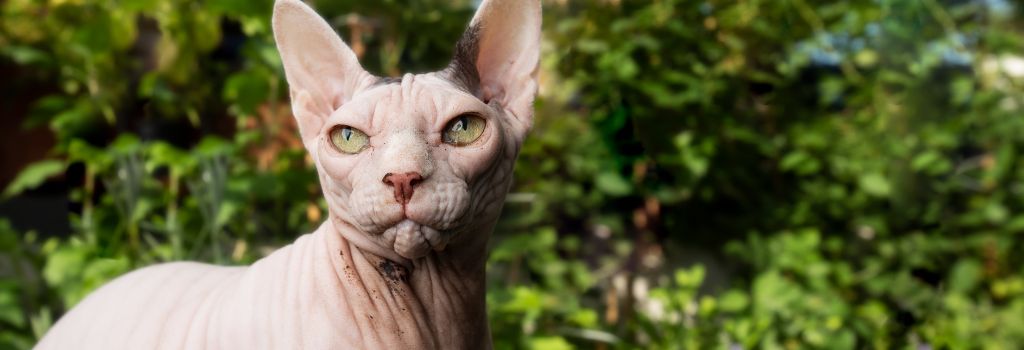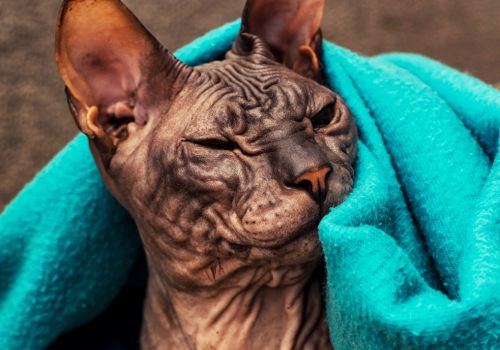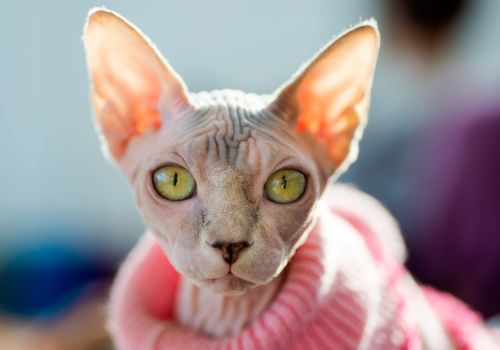
If you've found yourself utterly captivated by a pet that's a whirlwind of energy, a social butterfly, and the absolute master of cuddles, you're probably living with a Sphynx! These "Hairless Cats," as they're sometimes called, are unlike any other feline friend you'll ever meet.
The Traits We Adore
These cats are a full-package deal when it comes to devotion and loyalty. They're keenly in tune with your feelings—kind of like your feline therapist! What's more, these adorable oddballs love to play games. If "chase" was an Olympic sport, your Sphynx would bring home the gold.
But wait, there's more! Your Sphynx isn't just a cat; it's a one-feline comedy show. Their quirky, entertaining personalities keep you giggling, and if you think cats don't like heights, think again. Your Sphynx absolutely loves exploring those hard-to-reach places. They're super social creatures, adoring both human company and other feline friends. And let's not forget their smarts—they can perform tricks that would make even a dog jealous!
The Adorable Downsides
Of course, no pet is perfect (though your Sphynx comes close!). They've got some characteristics that you might call... well, "unique." For instance, your Sphynx will want to be the center of your world, and why not? They're pretty fabulous. But that also means they don't like to be alone for long periods.
You'll also find out pretty quickly that they have opinions—about everything. Seriously, if they could talk, you'd never get a word in! These creatures are chatty Kathies and not too fond of chilly weather. Bundle them up when it's cold, because they don't have a fur coat to keep them warm. Speaking of which, although they're incredibly social, some Sphynxes may play hard-to-get when it comes to being picked up and carried around.
A Bit of Background
Now, for some kitty trivia! Sphynxes are a proud Canadian export, first appearing as a natural mutation among Domestic Shorthaired cats. Breeders later crossed them with Devon Rex cats, giving them that distinct, furless look. While they lack a traditional fur coat, they do have a fuzzy peach-like down, mostly on their ears, face, tail, and feet.

A Few Final Tips
The Sphynx cat thrives indoors; they're not built for the cold, and they're susceptible to sunburn. Don't be surprised if you find them snuggled on top of your warm laptop, soaking up the sun by a window, or bundled up under your blankets. You could describe them as part cat, part dog, and part monkey—an all-in-one package of adorable complexity.
So, is the unique lifestyle of a Sphynx cat worth it? Absolutely! They're not just pets; they're an experience—a hilarious, heartwarming, and occasionally perplexing experience that you wouldn't trade for the world.
Genetic Predispositions for Sphynxes
The Heart of the Matter: Cardiomyopathy
When it comes to our Sphynxes, their hearts are as big as their personalities—but they can also be vulnerable. Cardiomyopathy is the official name for heart muscle disease. The most common form is Hypertrophic Cardiomyopathy (HCM), often linked to an overactive thyroid gland. Another type you might hear about is dilated cardiomyopathy (DCM), which was once linked to taurine deficiency but is now rare thanks to taurine-enriched cat food.
Don't let your cat's poker face fool you! While they're champs at hiding discomfort, look out for sudden symptoms like rapid breathing, lethargy, and poor appetite. An early diagnosis can be a lifesaver. This is one more reason to make sure your Sphynx gets checked by a vet twice a year. Some breeds even have genetic testing for HCM-specific genes—so get those wellness exams scheduled!
 Blood Clots: FATE’s Not So Great
Blood Clots: FATE’s Not So Great
If your Sphynx has heart issues, they could be at risk for FATE (feline aortic thromboembolism). Blood clots can form and get stuck, typically affecting the hind legs. This is an emergency situation! If you notice your cat struggling to walk or showing pain in the hind limbs, act swiftly. Medication can help prevent FATE, so consult your veterinarian for personalized advice.
Blood Types and Transfusions
Just like us, cats have different blood types—Type A, B, and sometimes even AB. If your Sphynx ever needs a blood transfusion, knowing theirblood type in advance can make all the difference. This is especially crucial for purebred cats like Sphynxes, which often have type B blood. Ask your veterinarian to include a blood typing test during regular check-ups. It's a small step that can be a huge lifesaver!
The Rare Case of Neonatal Isoerythrolysis (NI)
Though rare, nasopharyngeal polyp (NI) is a severe condition that can affect newborn kittens. This occurs when a kitten with type A blood suckles from a mother with type B blood or vice versa. Affected kittens usually don't survive long after birth. If you're considering breeding your Sphynx, this is a crucial conversation to have with your vet beforehand.

Grooming Woes: Alopecia
Surprise! Even hairless cats need grooming! Without a good bath, your Sphynx can get a greasy buildup on their skin. Their ears will also need cleaning to remove excess wax. So, make bath time a special bonding session, complete with ear cleaning and nail trims. Yes, and brush their teeth, too!
The Itchy Issue: Urticaria Pigmentosa
Itching can be a sign of many issues, but Sphynxes are sometimes prone to a skin condition called urticaria pigmentosa. Its exact cause is still under investigation, but it can be quite irritating for your feline friend. If you see your Sphynx scratching more than usual, a trip to the vet for diagnostic tests can help pinpoint the issue and get them the relief they need.
If you have questions and you'd like to reach out to us, you can call us directly at (941) 745-1875, or you can email us at [email protected]. Don't forget to follow us on social media Facebook, Instagram.
